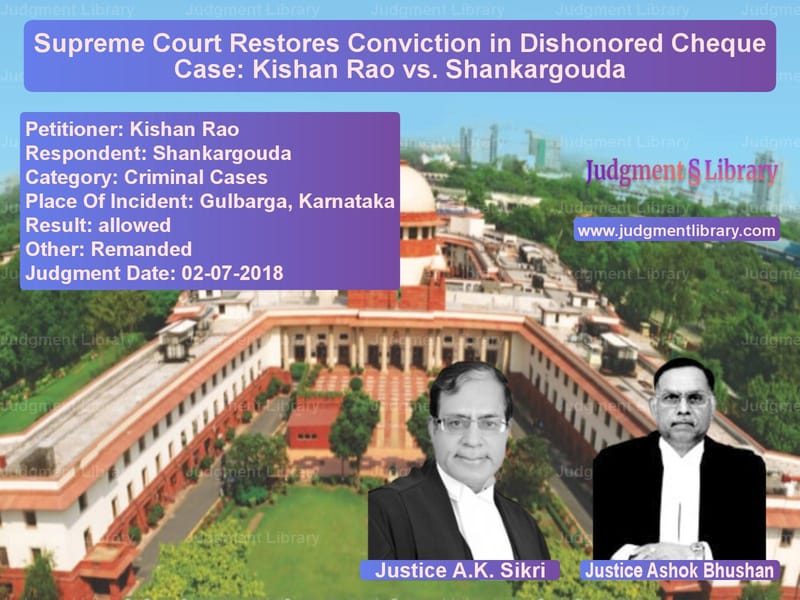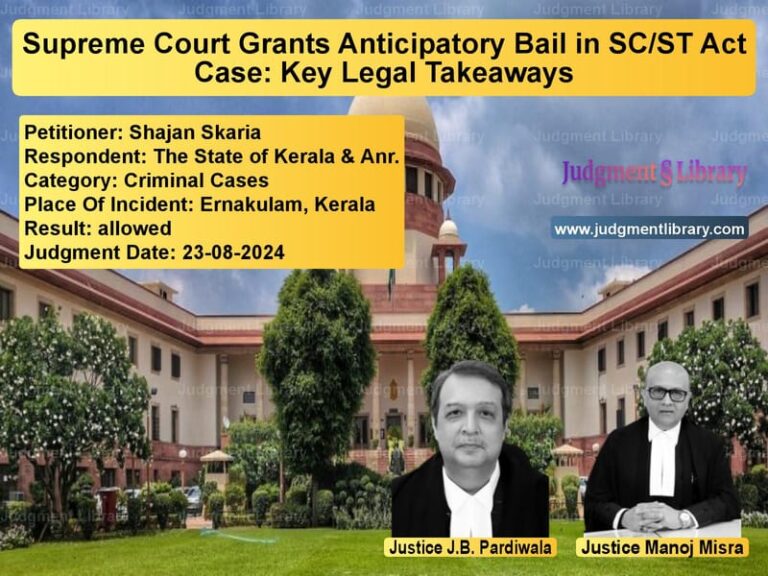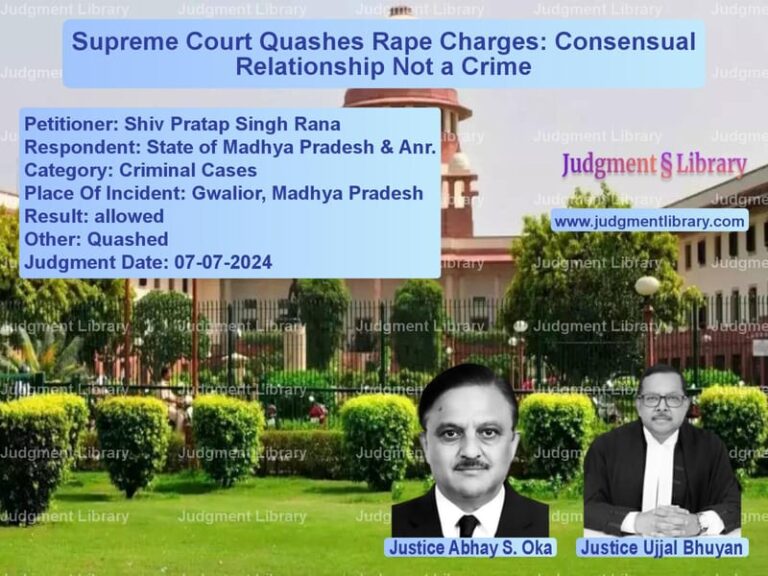Supreme Court Restores Conviction in Dishonored Cheque Case: Kishan Rao vs. Shankargouda
The Supreme Court of India, in the case of Kishan Rao vs. Shankargouda, addressed the issue of dishonored cheques under Section 138 of the Negotiable Instruments Act, 1881. The case revolved around a loan transaction where the respondent (accused) issued a cheque that was dishonored due to insufficient funds. The Court reinstated the conviction of the accused after the High Court had earlier acquitted him. This judgment underscores the principle that an accused must provide substantial evidence to rebut the statutory presumption of liability under Section 139 of the Act.
Background of the Case
The appellant (complainant) and the respondent (accused) had friendly relations. The accused approached the complainant for a loan of Rs.2,00,000 for business purposes and promised to repay the amount within one month. On December 25, 2005, the complainant extended a loan of Rs.2,00,000 to the accused.
To discharge this liability, the accused issued a post-dated cheque on January 25, 2006, in favor of the complainant. When the complainant presented the cheque for collection at the Bank of Maharashtra, Gulbarga, it was returned due to insufficient funds. At the accused’s request, the cheque was re-presented on March 1, 2006, but was again dishonored.
The complainant issued a legal notice on March 14, 2006, demanding payment, but the accused failed to comply. A criminal complaint under Section 138 of the Negotiable Instruments Act, 1881, was subsequently filed.
Key Legal Issues Considered
- Whether the accused successfully rebutted the statutory presumption under Section 139 of the Act.
- The scope of revisional jurisdiction under Sections 397/401 of the Criminal Procedure Code (CrPC) exercised by the High Court.
- Whether the accused’s mere denial of the transaction was sufficient to displace the presumption under Section 139.
Arguments Presented
Arguments by the Appellant (Kishan Rao)
- The complainant argued that the trial court rightly convicted the accused based on the presumption under Section 139 of the Act.
- The accused admitted issuing the cheque but falsely claimed it had been stolen by the complainant.
- The bank official confirmed that the cheque was dishonored due to insufficient funds, not because of any discrepancy in the accused’s signature.
- The accused did not lead any evidence to rebut the statutory presumption in favor of the complainant.
Arguments by the Respondent (Shankargouda)
- The accused denied the existence of any debt or liability.
- He claimed that the complainant had stolen the cheque and misused it.
- He argued that the complainant had failed to establish the loan transaction through independent witnesses.
- The High Court rightly set aside the conviction, as the trial court and appellate court had erred in merely relying on the presumption under Section 139.
Supreme Court’s Observations
The Supreme Court examined the evidence and determined that the accused had failed to rebut the presumption under Section 139. The Court emphasized:
“The presumption mandated by Section 139 includes the existence of a legally enforceable debt or liability. This is a rebuttable presumption, but the burden to disprove it lies on the accused.”
The Court cited its previous ruling in Rangappa vs. Sri Mohan (2010), stating that an accused cannot merely deny liability but must provide concrete evidence to displace the statutory presumption.
High Court’s Error in Revisional Jurisdiction
The Supreme Court held that the High Court had exceeded its revisional jurisdiction by substituting its own findings for those of the trial court and appellate court. The High Court had no authority to reappreciate the evidence unless there was a glaring miscarriage of justice.
“In its revisional jurisdiction, the High Court cannot substitute its own opinion unless the findings of the trial court are perverse or based on no evidence.”
Final Judgment
The Supreme Court ruled:
- The High Court’s order acquitting the accused was set aside.
- The conviction of the accused under Section 138 of the Negotiable Instruments Act was restored.
- The accused was sentenced to six months’ simple imprisonment and a fine of Rs.2,50,000.
- If the fine was not paid, the accused would undergo additional imprisonment of three months.
Impact of the Judgment
This ruling has significant implications for cheque bounce cases:
- Strengthening of Section 138 Cases: The judgment reinforces that courts must presume liability under Section 139 unless the accused provides substantial evidence to rebut the presumption.
- Limits on High Court’s Revisional Powers: The ruling restricts High Courts from reappreciating evidence unless there is a clear miscarriage of justice.
- Prevention of Frivolous Defenses: The decision discourages accused persons from taking baseless defenses such as stolen cheques without supporting evidence.
- Faster Resolution of Cases: By reaffirming the presumption under Section 139, the judgment expedites the resolution of dishonored cheque cases.
Legal Precedents Considered
The Court referred to various judgments, including:
- Rangappa vs. Sri Mohan (2010) – Affirmed that Section 139 creates a rebuttable presumption in favor of the complainant.
- Kumar Exports vs. Sharma Carpets (2009) – Held that the accused must present evidence to rebut the presumption.
- Sanjaysinh Ramrao Chavan vs. Dattatray Gulabrao Phalke (2015) – Limited the scope of revisional jurisdiction of High Courts.
Conclusion
The Supreme Court’s decision in Kishan Rao vs. Shankargouda is a landmark ruling reinforcing the strict liability of dishonored cheque cases under Section 138 of the Negotiable Instruments Act. By restoring the conviction, the Court ensured that statutory presumptions are given full effect and that accused persons cannot escape liability merely by offering unsubstantiated defenses. This ruling provides clarity on the application of Section 139 and limits the interference of High Courts in revisional jurisdiction.
Petitioner Name: Kishan Rao.Respondent Name: Shankargouda.Judgment By: Justice A.K. Sikri, Justice Ashok Bhushan.Place Of Incident: Gulbarga, Karnataka.Judgment Date: 02-07-2018.
Don’t miss out on the full details! Download the complete judgment in PDF format below and gain valuable insights instantly!
Download Judgment: Kishan Rao vs Shankargouda Supreme Court of India Judgment Dated 02-07-2018.pdf
Direct Downlaod Judgment: Direct downlaod this Judgment
See all petitions in Fraud and Forgery
See all petitions in Judgment by A.K. Sikri
See all petitions in Judgment by Ashok Bhushan
See all petitions in allowed
See all petitions in Remanded
See all petitions in supreme court of India judgments July 2018
See all petitions in 2018 judgments
See all posts in Criminal Cases Category
See all allowed petitions in Criminal Cases Category
See all Dismissed petitions in Criminal Cases Category
See all partially allowed petitions in Criminal Cases Category







